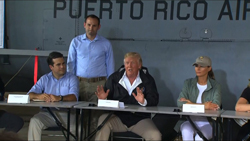For the first time in over 30 years, the leaders of two countries; the United States and the Islamic Republic of Iran, have spoken. President Barack Obama and President Hassan Rouhani, have broken the deafening silence which has been the trademark of the relationship with a phone call, according to NPR.com. Such steps forward has many spectators asking the same the question: is this a fresh start for the countries?
In 1953, the CIA supported a coup that overthrew the democratically elected leader of Iran for one friendlier to the US. This all changed in 1979 when, after over twenty years, Iranian leader Shah Mohammad Mossadeq was ousted and replaced by Ayatollah Khomeini. In a matter of days, the Kingdom of Iran transformed into the Islamic Republic of Iran. Weeks later, after Iranians stormed the American embassy, the workers were held hostage and America entered into the Iranian Hostage Crisis. After 444 days, when all the hostages were released, the U.S. formally cut all ties to Iran, according to BBC.com.
For over 30 years, the silence between the two have dominated any possible dialogue the countries could have. The situation only became more tense when allegations of Uranium enrichment and the building of nuclear facilities came to light in 2002. Most recently it has become apparent that Iran is propping up one of it’s staunchest allies in the region, Bashar Al-Assad’ s government in the Syrian Civil War, according to CS Monitor.com..
Dr. Saliba Sarsar, Associate Vice President for Global Initiatives, explained “Behind-the-scenes preparatory talks probably made the call possible. It comes at a crucial time: Iran has nuclear ambitions but suffers from major UN and non-UN-mandated sanctions.” He went on to say “The call is meant ‘to break the ice’ and defuse some of the tense conditions in the Middle East.
Michael Hamliton, senior year political science major reflected on the coming together of the two countries, “It looks like the tension between the two countries should be growing, especially with Iran backing regimes that have positioned themselves against the U.S. But tension can easily be relieved with a simple trick: talking. By just doing that you’re starting to defuse a situation. This is particularly important when you look at each countries’ actions toward each other.”
Hamilton could be speaking of recent history, when looking at Rouhani’s predecessor, ultra-nationalistic and conservative Mahmoud Ahmadinejad. It looked as if the United States would inevitably be locking horns with Iran over its nuclear program or Ahmadinejad’s low opinion of Jews.
According to The New York Times, not all parties are as ready to make amends with Iran. Israelis and Saudi Arabians watch on and consider the Obama Administration’s dropping its guard as “naïve.” The goal of the Iranians negotiating is not for the peace process to play it’s course and for every country lives safely and happily. The dialogue between Iran and the US is rather a ploy to buy time to build its long sought after nuclear bomb.
“It’s not just that forever we go on with an Iranian nuclear program that never reaches conclusion, it’s that diplomacy can be a way of helping it get to the finishing line,” cautioned Jonathan Spyer of the Interdisciplinary Center in Herzliya, according to The New York Times.
Yoel Guzansky, the one who handled the file on Iranian nuclear progress for the Israeli prime minister’s security council said the new momentum for talks with Iran about its nuclear program had “sidelined” Israel as “a potential spoiler.”
He explained, “You can’t do anything while Iran and the U.S. are talking, you’ll just be someone who is destroying the last chance for peace,” said Guzansky.
“If there is a change of tone in Iran and Washington, Israel should also change the tone. If there is a deal we embrace it, we support it, but show us the details,” said Guzansky.


